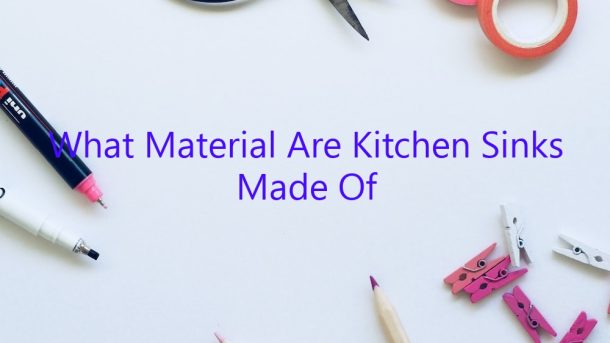What Material Are Kitchen Sinks Made Of
Kitchen sinks are one of the most important features in any kitchen. They come in a variety of shapes and sizes, and are made from a variety of materials. When it comes time to buy a new kitchen sink, it is important to know what materials are available, and which one is best for your needs.
The most common material for kitchen sinks is stainless steel. Stainless steel is durable, easy to clean, and corrosion-resistant. It is also a relatively cheap option, making it a popular choice for budget-minded homeowners.
Another popular material for kitchen sinks is porcelain. Porcelain is a type of ceramic that is fired at a high temperature, making it durable and easy to clean. It is also resistant to staining and chipping. Porcelain sinks are typically more expensive than stainless steel sinks, but they can add a touch of elegance to any kitchen.
Some kitchen sinks are made from composite materials, such as granite or quartz. These sinks are made from a mixture of natural and synthetic materials, and are typically quite durable. However, they can be quite expensive, and they require a fair amount of maintenance to keep them looking their best.
Ultimately, the best material for a kitchen sink depends on your needs and budget. If you are looking for a durable, easy-to-clean sink that will last for years, stainless steel is a good option. If you are looking for a more decorative sink that will add some style to your kitchen, porcelain is a good choice. And if you are looking for a high-quality, durable sink that is resistant to scratches and chips, composite materials are a good option.
Contents
What are most kitchen sinks made out of?
Most kitchen sinks are made out of stainless steel. However, there are a few different materials that kitchen sinks can be made out of.
Stainless steel is the most popular type of kitchen sink material. Stainless steel is durable, easy to clean, and resistant to corrosion. There are a few different types of stainless steel kitchen sinks, such as brushed stainless steel, satin stainless steel, and polished stainless steel.
Another popular kitchen sink material is porcelain. Porcelain kitchen sinks are made from a type of ceramic called vitreous china. Porcelain kitchen sinks are durable, easy to clean, and resistant to scratches and chips.
Other kitchen sink materials include cast iron, enameled cast iron, granite, and quartz. Cast iron kitchen sinks are durable and heavy, but they can be difficult to clean. Enameled cast iron kitchen sinks are durable, easy to clean, and resistant to chips and scratches. Granite kitchen sinks are durable and heat resistant, but they can be expensive. Quartz kitchen sinks are durable and heat resistant, but they can be expensive and difficult to maintain.
What material are white kitchen sinks made of?
White kitchen sinks are made from a variety of materials, including cast iron, stainless steel, and porcelain. Cast iron kitchen sinks are very durable and can last for many years, but they are also the heaviest type of sink and can be difficult to install. Stainless steel sinks are also very durable and easy to clean, but they can also be scratched or damaged if not taken care of properly. Porcelain sinks are the most popular type of sink and come in a variety of colors, including white. They are also the most durable type of sink and are easy to clean.
How do I know what material My sink is made of?
There are a few ways to determine the material of your sink. The most obvious is to look at the sink itself. Most sinks are made of either stainless steel, porcelain, or plastic. If you can’t tell by looking, you can try contacting the manufacturer. They should be able to tell you what the sink is made of. Another way to determine the sink’s material is to take a magnet to it. If the magnet sticks, the sink is made of stainless steel. If the magnet doesn’t stick, the sink is made of another material.
What are sinks normally made of?
What are sinks normally made of?
Sinks are commonly made of stainless steel, porcelain, or granite. Stainless steel is a common material because it is durable and easy to clean. Porcelain is also a durable material, and it is usually white, which can brighten up a kitchen. Granite is a popular material for sinks because it is durable and has a unique appearance.
What is the most durable sink material?
There are many factors to consider when choosing a sink for your kitchen. One of the most important factors is the material the sink is made from. Some materials are more durable than others and can withstand everyday use better.
The most durable sink material is stainless steel. Stainless steel is a metal that is made up of several different metals, including nickel and chromium. It is highly resistant to corrosion and rust, making it a great choice for a kitchen sink. It is also easy to clean and does not show dirt and smudges easily.
If you are looking for a durable sink material that is a little bit less expensive than stainless steel, then porcelain may be a good option for you. Porcelain is a type of ceramic that is made from a mixture of clay and minerals. It is fired in a kiln, which makes it very hard and durable. Porcelain is also non-porous, which means that it does not absorb liquids or bacteria, making it a great choice for a kitchen sink.
If you are looking for a sink material that is easy to care for and environmentally friendly, then bamboo may be a good option for you. Bamboo is a type of grass that is sustainably harvested and is therefore environmentally friendly. It is also very strong and durable, making it a great choice for a kitchen sink.
Do stainless steel sinks scratch easily?
A stainless steel sink is a popular choice for a kitchen sink because it is durable and easy to clean. However, some people wonder if stainless steel sinks scratch easily.
The short answer is that stainless steel sinks can scratch if they are not cared for properly. To prevent scratches, you should use a soft cloth and a non-abrasive cleaner to clean your sink. You should also avoid using sharp objects near your sink.
If your stainless steel sink does scratch, you can use a touch-up pen to repair the scratch. Touch-up pens are available at most hardware stores.
If you are concerned about scratches, you may want to consider a porcelain sink, which is less likely to scratch.
What is the easiest kitchen sink to keep clean?
There is no definitive answer to this question as it depends on the individual’s level of cleanliness and how they use their kitchen sink. However, some sinks may be easier to keep clean than others.
One factor that can affect how easy a kitchen sink is to keep clean is the material it is made from. Stainless steel sinks are generally considered to be the easiest to clean, as they are non-porous and do not harbour bacteria. Plastic sinks can also be easy to clean, but they can be scratched more easily than stainless steel. Ceramic sinks can be difficult to clean, as they are porous and can harbour bacteria, and they are also more likely to chip and break.
Another factor that can affect how easy a kitchen sink is to keep clean is the size and shape of the sink. A smaller sink is generally easier to keep clean than a larger one, as there is less space for dirt and debris to accumulate. A rectangular sink is also generally easier to keep clean than a circular one, as there are more flat surfaces for dirt and grime to accumulate.
How a person uses their kitchen sink can also affect how easy it is to keep clean. If a person regularly cleans their sink with hot water and soap, it will be easier to keep clean than if they only use it to rinse dishes. Also, if a person regularly empties their sink of debris and dirty water, it will be easier to keep clean than if they let it build up.
So, while there is no definitive answer to the question of what is the easiest kitchen sink to keep clean, some factors that can affect this include the material the sink is made from, the size and shape of the sink, and how a person uses their sink.




